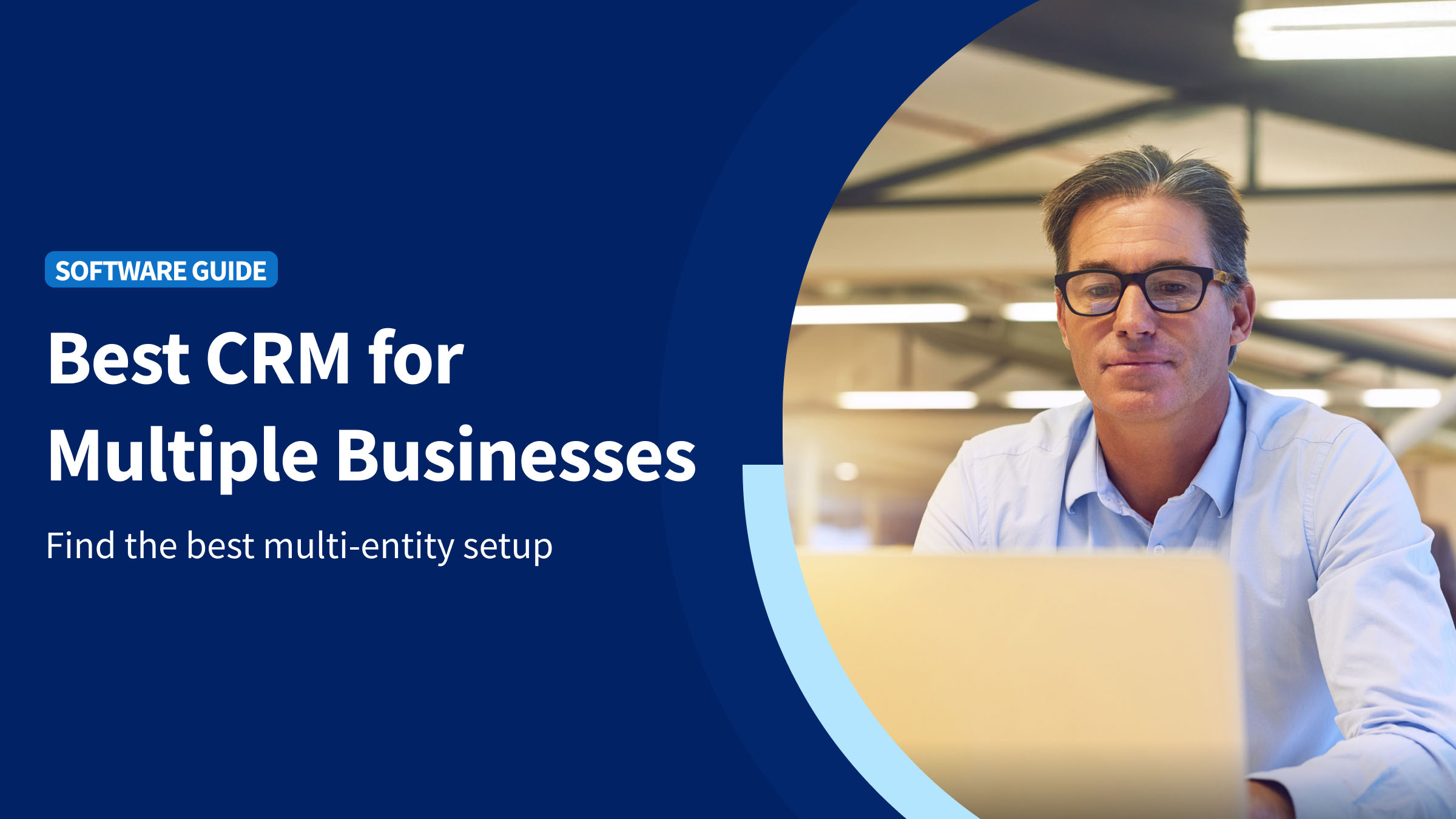Managing multiple businesses is a serious achievement, but it comes with its own set of challenges.
Juggling customer lists, sales pipelines, and financial records across separate QuickBooks accounts can drain your time and create costly inefficiencies. Worse, it can lead to errors that can have negative cascading effects on your ability to optimize financial reporting and strategic planning.
Without a multi-entity customer relationship management system (CRM), scattered data leads to missed sales, fragmented service, and chaotic operations. Startlingly, studies have shown that businesses may lose an estimated 20% to 30% of their revenue to data silo inefficiencies, with workers spending significant portions of their work week searching for relevant information. These silos, of course, are compounded when managing greater complexity, or multiple businesses.
This is where Method CRM pays dividends. Unlike other platforms that require complex workarounds or multiple logins for each account, Method is purpose-built for businesses with diverse operations.
Below, we’ll dive into the challenges of managing multiple businesses and offer guidance on which CRM tools and features you need to make this process less of a headache.
Why is managing multiple businesses such a challenge?
As you likely know, running multiple businesses means managing a constant flow of customer interactions, sales opportunities, and financial data—split across separate entities. This is a great problem to have (more business!), but it’s also a challenge that only grows as you expand your operations.
Without a centralized system, data quickly becomes scattered, fragmented, and frustratingly out of reach. Unfortunately, that’s not just a small inconvenience, but a major operational roadblock that can stall and confuse everything from financial reporting to customer engagement to staff alignment.
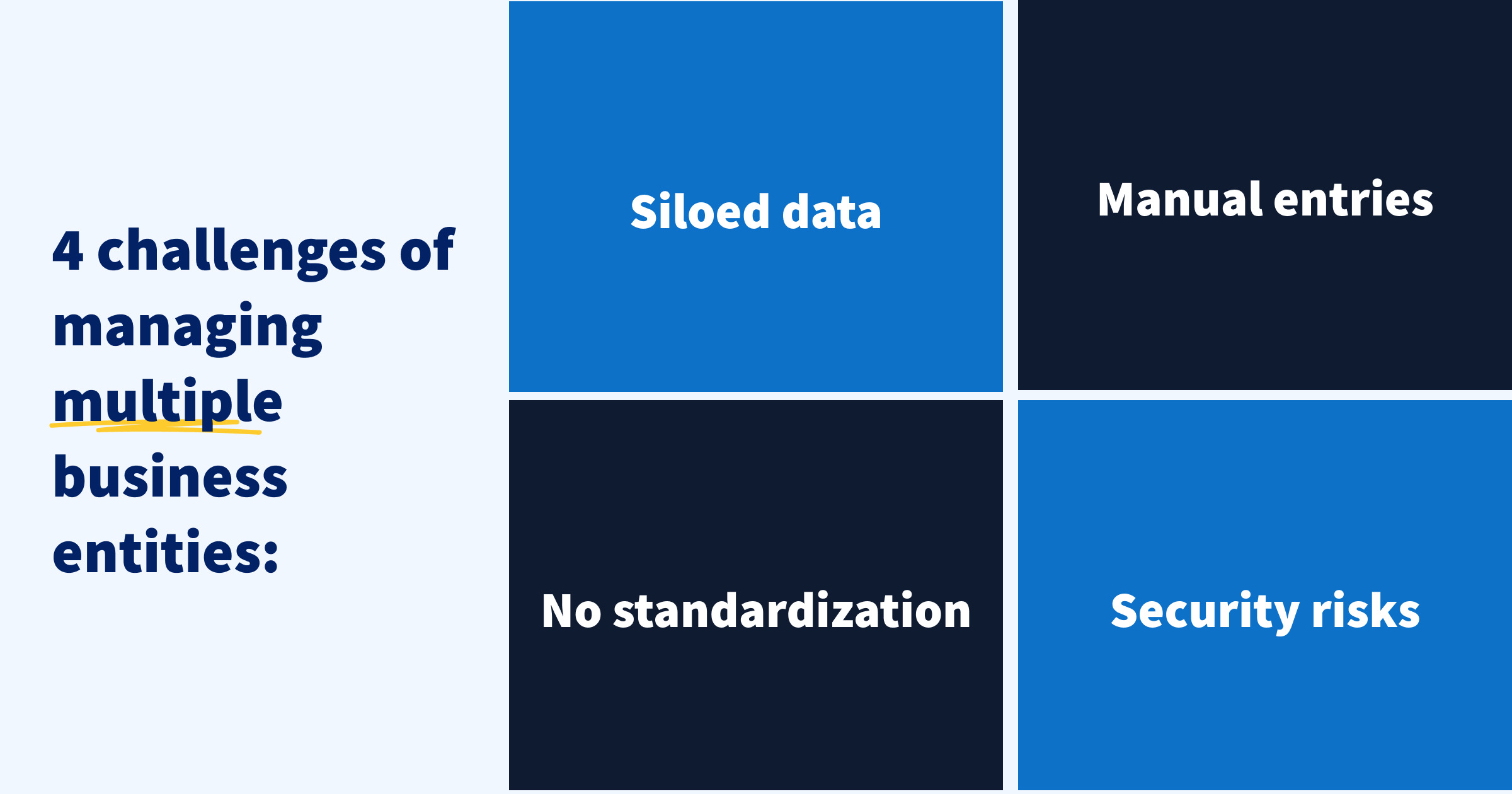
Let’s explore some of the specific challenges you’re likely facing.
Data silos and fragmented systems
One of the biggest issues of managing multiple businesses is data silos. When each business maintains its own customer lists, sales histories, and financial records in separate systems, you end up with disconnected information.
As mentioned above, this isn’t just an inconvenience—it’s a financial risk. Poor-quality or duplicate data costs U.S. businesses approximately $3.1 trillion annually, and companies with siloed data see significant hits and financial drain due to poor operational efficiency.
Without a unified system, valuable insights slip through the cracks, and efficiency suffers.
Operational inefficiency and growth challenges
As businesses grow and diversify, so does the volume of customer data. Workers already spend hours each week searching for information or recreating documents—a process that compounds with greater complexity and more systems.
For multi-business owners, this time drain multiplies across teams, reducing productivity and driving up costs. Solving this problem unlocks significant operational gains for these business owners, which has cascading benefits for revenue, efficiency, and employee morale.
Lack of standardization and integration issues
Every business has unique processes. But if you’re trying to operate as a singular entity with multiple, disconnected processes, these differences can lead to chaos.
Sales processes, customer service protocols, and reporting standards often vary between businesses, resulting in inconsistent customer experiences and missed revenue.
For example, if critical customer information is isolated to one system or building, cross-selling to other parts of your business becomes nearly impossible. You have no visibility into which parts of your business serve which customer, eliminating your ability to identify opportunities to serve that customer better.
This lack of connectivity also creates bottlenecks and blindsides when customers need quick answers about different parts of the business. Connecting all of this data together through a unified CRM ensures that every employee has insights into how different parts of the business serve each customer.
Security and permissions
Scattered data also poses security risks. Simply put, there are more potential attack services for bad actors to target, and more potential security loopholes for them to exploit. Centralizing systems under a singular, highly secure data environment helps to narrow this attack service and protect all data under your management.
It’s tough to overstate the importance of data security today. The average cost of a data breach, according to IBM, reached $4.88 million. A key factor leading to those breaches? Disconnected systems.
Without a centralized CRM, enforcing consistent security policies, access controls, and data backups across businesses becomes a nightmare.
What to look for in a CRM for multiple businesses
When you’re running more than one business, your CRM software has to do more than just store contact records. It needs to act as a centralized hub that brings clarity, coordination, and consistency across every business unit.
That means having all-in-one functionality that supports multiple data sets, syncing with separate financial systems, keeping teams aligned, and scaling as you grow.
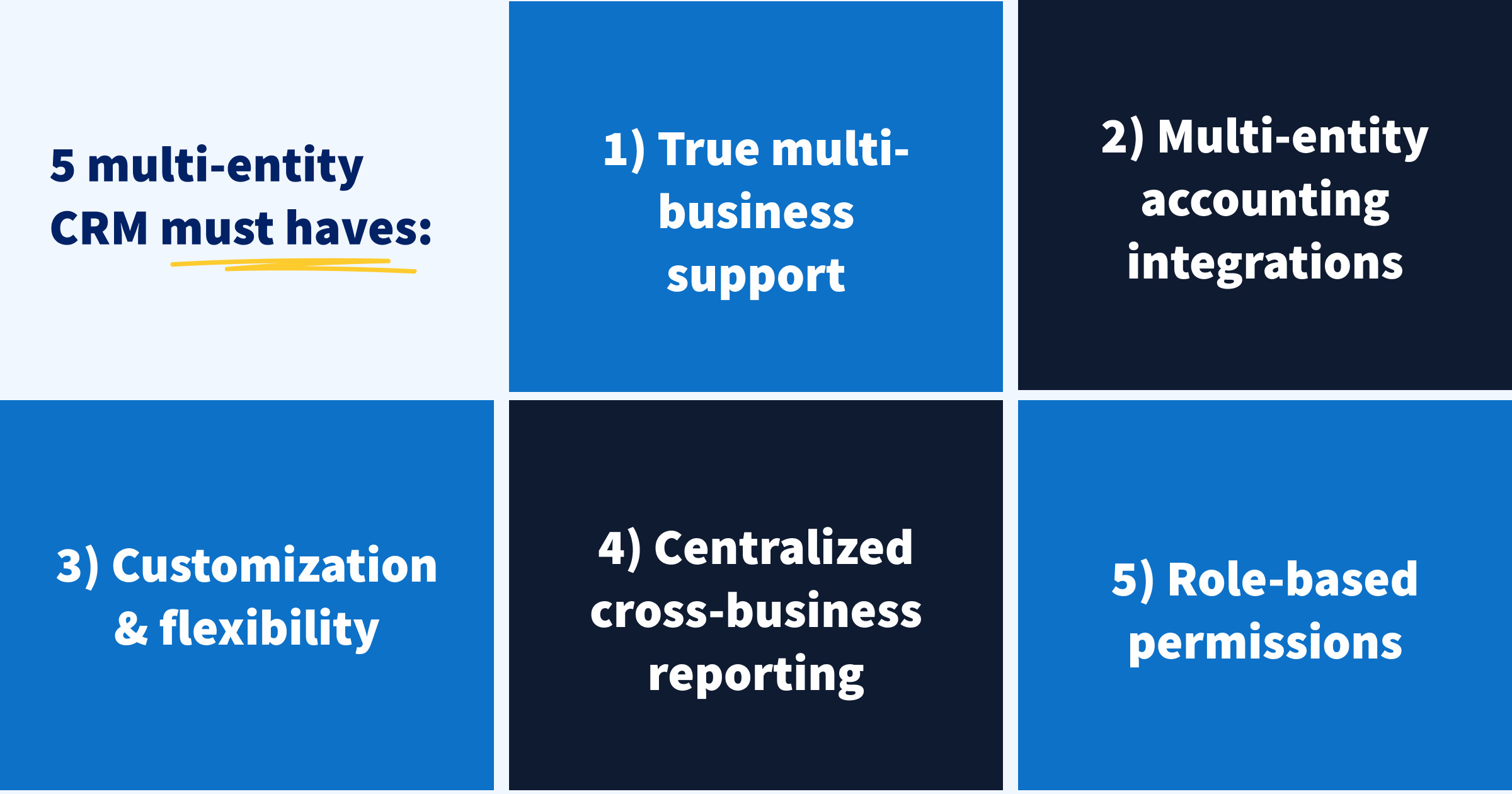
It’s a tall order, but here’s how to tell when you’re found the right solution.
1. True multi-business support
Your CRM should support multiple companies or entities in one system, without requiring separate accounts, logins, or clunky workarounds.
Look for key features like:
- Isolated data sets per business or division (e.g. contacts, deals, activities) to avoid overlap or confusion.
- Entity-level workflows and automation, so each business can follow its own processes.
- The ability to assign records, pipelines, and reports to specific business units.
- A unified login with easy switching between businesses or dashboards under one admin account.
Without this, you’re stuck managing several disconnected systems or relying on tags and filters that can easily break. This, really, is a non-negotiable for anybody managing multiple businesses.
2. Multi-company accounting integrations
If you use QuickBooks for each business, make sure your CRM can handle multiple QuickBooks accounts.
Ideally with:
- Real-time, two-way sync for each QuickBooks file—updates in the CRM reflect in accounting, and vice versa.
- Support for both QuickBooks Online and Desktop.
- Custom field mapping controls to ensure customer, invoice, and payment data flows accurately between systems.
- Sync options by entity, so each business’s CRM records match its accounting file.
This eliminates double data entry, reduces errors, and keeps your finances clean across all businesses.
3. Workflow customization and flexibility
Each of your businesses likely operates a bit differently. Your CRM should be able to adapt with these nuances.
Specifically, look for the ability to:
- Customize fields, forms, and screens for each business or user group.
- Build automated workflows that match how each business sells, serves, or delivers.
- Add or remove modules depending on what each business needs—without developer help.
- Use drag-and-drop tools to change layouts or logic based on business rules.
A one-size-fits-all CRM will either slow you down or force you to change proven processes. Look for one that’s customizable and can expand and adapt with your business.
4. Centralized dashboards and cross-business reporting
You need to be able to see performance across all entities, or zoom into one when needed. This ensures that you can maintain transparency across all business lines, and adapt to opportunities and challenges as they arise:
Look for:
- Cross-entity reporting dashboards that give you a consolidated view of sales, customers, or activity.
- Filters to drill down into specific businesses or compare performance between them.
- Configurable KPIs and widgets for different users—owners, sales leaders, or finance staff.
Without centralized reporting, you’re piecing together spreadsheets and struggling to make decisions with partial data and unclear metrics—something that will become costly as your businesses grow and diversify.
5. Role-based user access and permissions
As we mentioned earlier, data security and privacy are absolutely critical when managing multiple operations. This comes from a combination of centralizing your operations to a single surface, and ensuring you have security permissions—like access control and permissions—to tightly control who has access to your data.
Your CRM should offer:
- Granular permissions that limit access by business, role, or team member.
- Ability to assign users to specific entities during onboarding and restrict visibility to only relevant records.
- Configurable admin and user roles, so responsibilities are clearly defined.
- Audit logs and visibility settings for accountability.
This keeps teams focused on just the information that’s relevant to them. and protects sensitive data across business units by ensuring only users that need access to specific data have it.
| Bottom line: A CRM for multiple businesses should help you streamline operations, not stitch systems together. Look for one that centralizes your data, integrates with accounting tools like QuickBooks, adapts to how each business runs, and grows with you. These features are what enable you to scale with control—whether you’re managing two companies or twenty. |
Top 7 CRMs for managing multiple business
Choosing the right CRM for managing multiple businesses isn’t just about ticking feature boxes. It’s about finding a platform that supports your growth without unnecessary complexity or cost. Here’s a closer look at some of the leading CRM solutions available, starting with the one built specifically for QuickBooks-centric, multi-entity operations.
Method CRM: Purpose-built for multi-entity operations
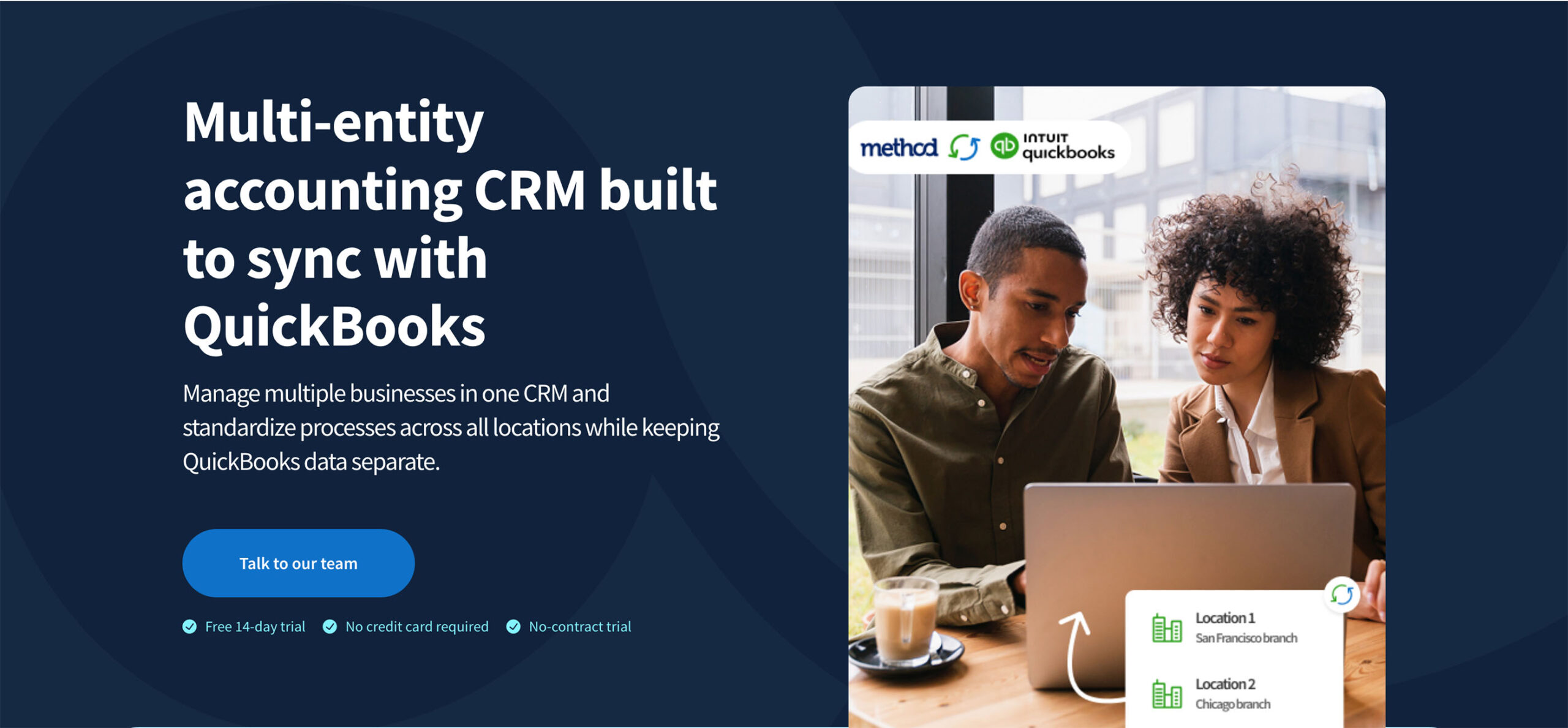
Method CRM is designed from the ground up for businesses that juggle multiple QuickBooks accounts, complex workflows, and diverse customer relationships.
It stands out for its deep QuickBooks integration, ease of use, multi-tenant architecture, and extensive customization options, making it a strong choice for owners who want a single, unified system.
Strengths:
- Multi-QuickBooks sync. Real-time, two-way sync with multiple QuickBooks files, eliminating data silos and reducing manual entry. This is a critical advantage for businesses with complex accounting needs, like Container One, which scaled to 80+ users and doubled its revenue in three years by centralizing data in Method CRM.
- Customization without code. Unlike other platforms, which often require developer support for customization, Method allows you to build custom tables, fields, and workflows without coding. This makes it ideal for multi-business owners who need tailored solutions without investing in developer resources. Method also gives you access to a team of CRM customization experts to build your platform just right.
- Scalability and centralized control. Method’s cloud-based design means you can scale users, entities, and data without slowing down. Its centralized reporting tools offer a single-pane-of-glass view across all your businesses, making it easier to track performance and identify growth opportunities.
Limitations:
- Primarily focused on QuickBooks users, which may not suit businesses using other accounting platforms.
- Advanced customization can be overwhelming for less tech-savvy users, despite its no-code design.
Zoho CRM: Affordable but limited for multi-businesses
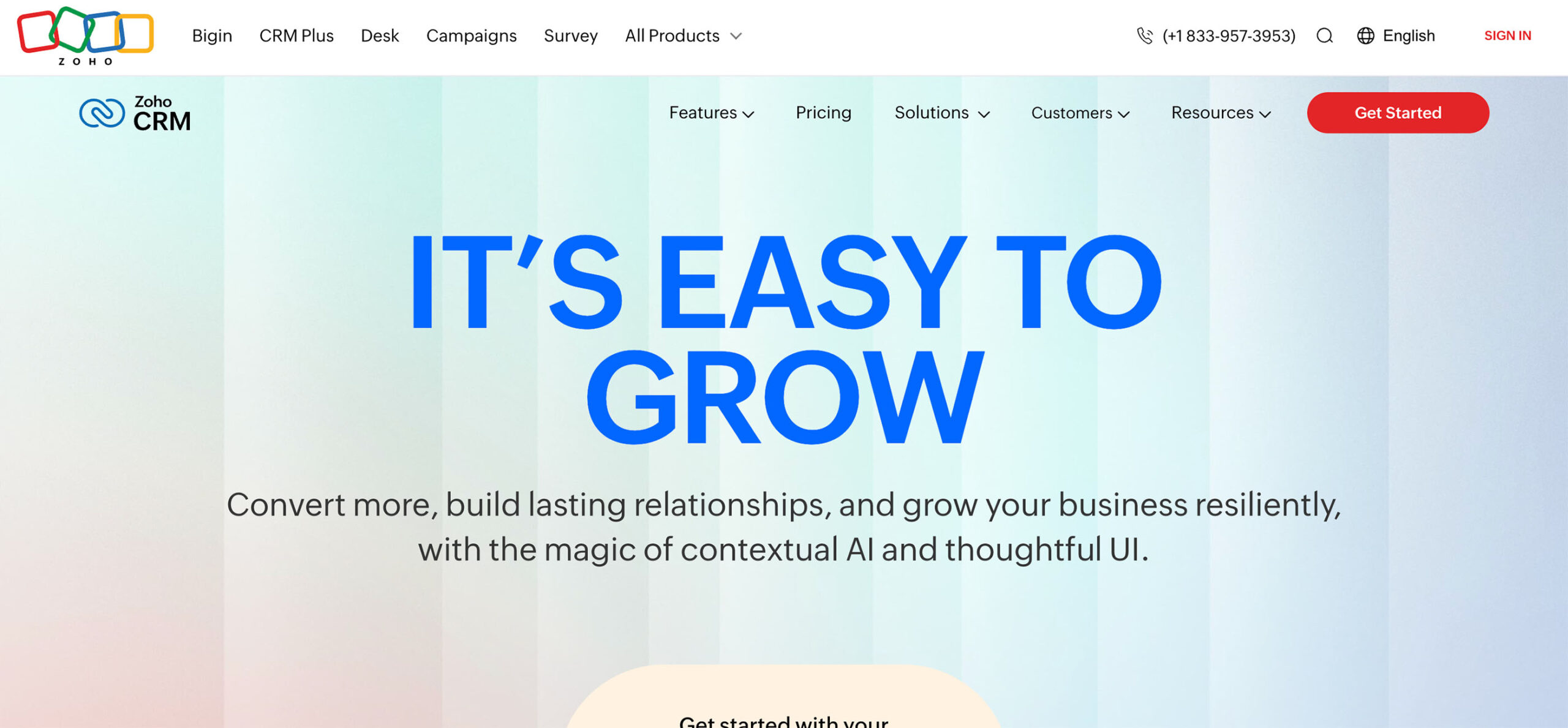
Zoho CRM is known for its affordability and wide feature set, but it struggles with true multi-entity support. Zoho’s standard setup is designed for single-business use, requiring either separate accounts or complex tagging to handle multiple entities.
Strengths:
- Cost-effective for small businesses and startups with straightforward needs.
- Extensive third-party integrations through Zoho One.
- Customizable with Deluge scripting, though this adds complexity.
Limitations:
- Officially limits each account to a single legal entity within one instance of Zoho CRM.
- Multi-entity management requires clunky workarounds or separate subscriptions, driving up costs and administrative overhead.
Keep reading: Learn about the differences between Method CRM vs. Zoho CRM.
HubSpot CRM: Great for marketing, weak on multi-entity
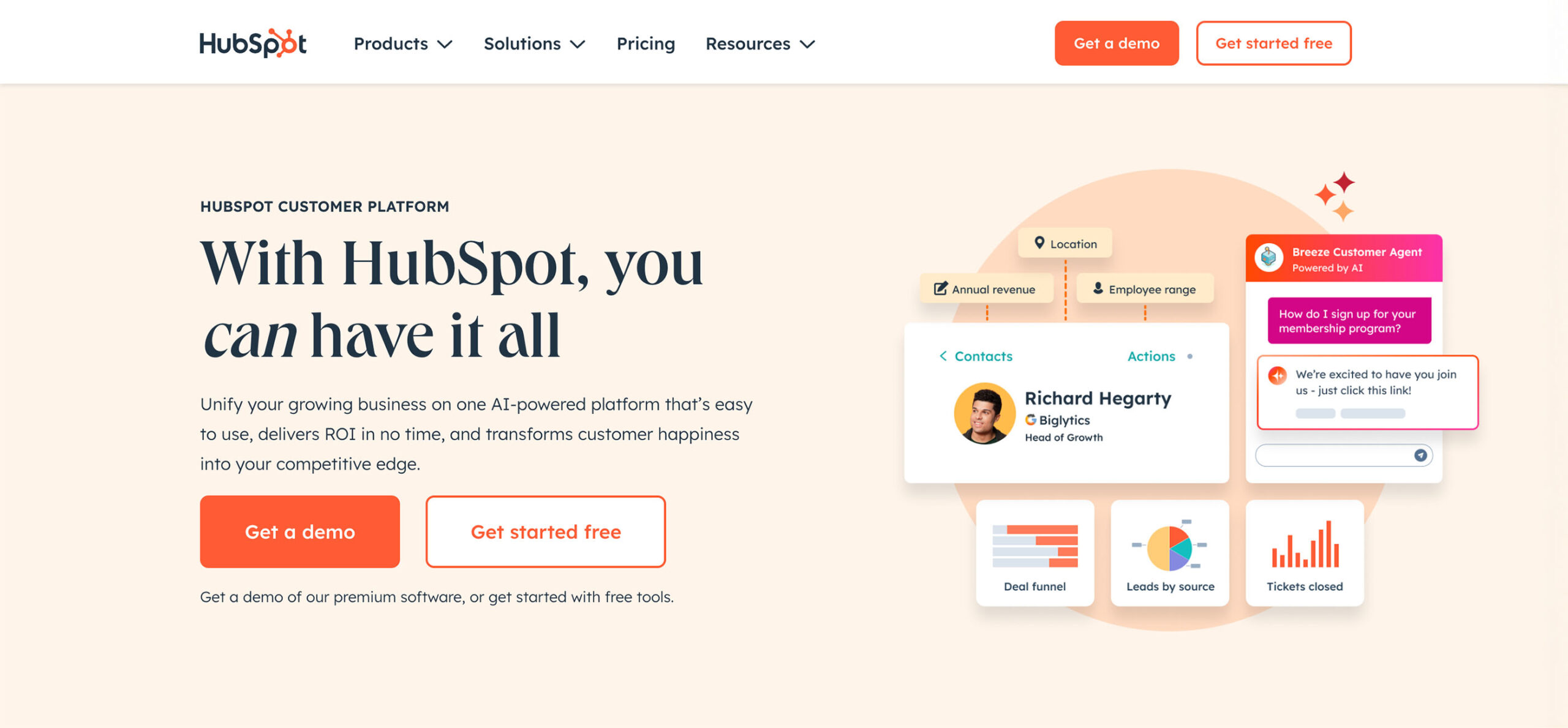
HubSpot is a popular choice for its powerful marketing tools—such as email marketing and social media marketing—but it falls short for multi-business owners. HubSpot’s Business Units add-on is an attempt to address this, but it’s pricey and still lacks the deep financial integration that many multi-entity businesses need.
Strengths:
- Excellent marketing automation and sales tools.
- Built-in email templates for customer communications and follow-ups.
- Strong user experience and easy-to-use interface.
- Built-in content marketing and SEO features.
Limitations:
- Expensive for multi-entity setups, with Business Units requiring significant add-on costs.
- Limited to one QuickBooks connection per CRM account, restricting financial flexibility.
Salesforce: powerful but complex for multi-entity use
Salesforce is the CRM giant known for its customization and scalability, but its complexity and cost can be a barrier for smaller businesses or those with multiple entities.
Strengths:
- Highly customizable with extensive app marketplace.
- Advanced reporting and analytics capabilities.
- Ability to track lead sources from a wide range of channels, including social media and websites.
- Scalable for large enterprises with extensive API capabilities.
Limitations:
- High cost of ownership, including developer support for customization.
- Complex setup and steep learning curve, which can delay ROI.
- Not ideal for QuickBooks-centric businesses without extensive third-party integrations.
Keep reading: Need some help deciding between Method, HubSpot, and Salesforce? Read our detailed guide comparing Salesforce vs. HubSpot CRM vs. Method CRM.
Freshsales: Simple but limited for multi-business owners
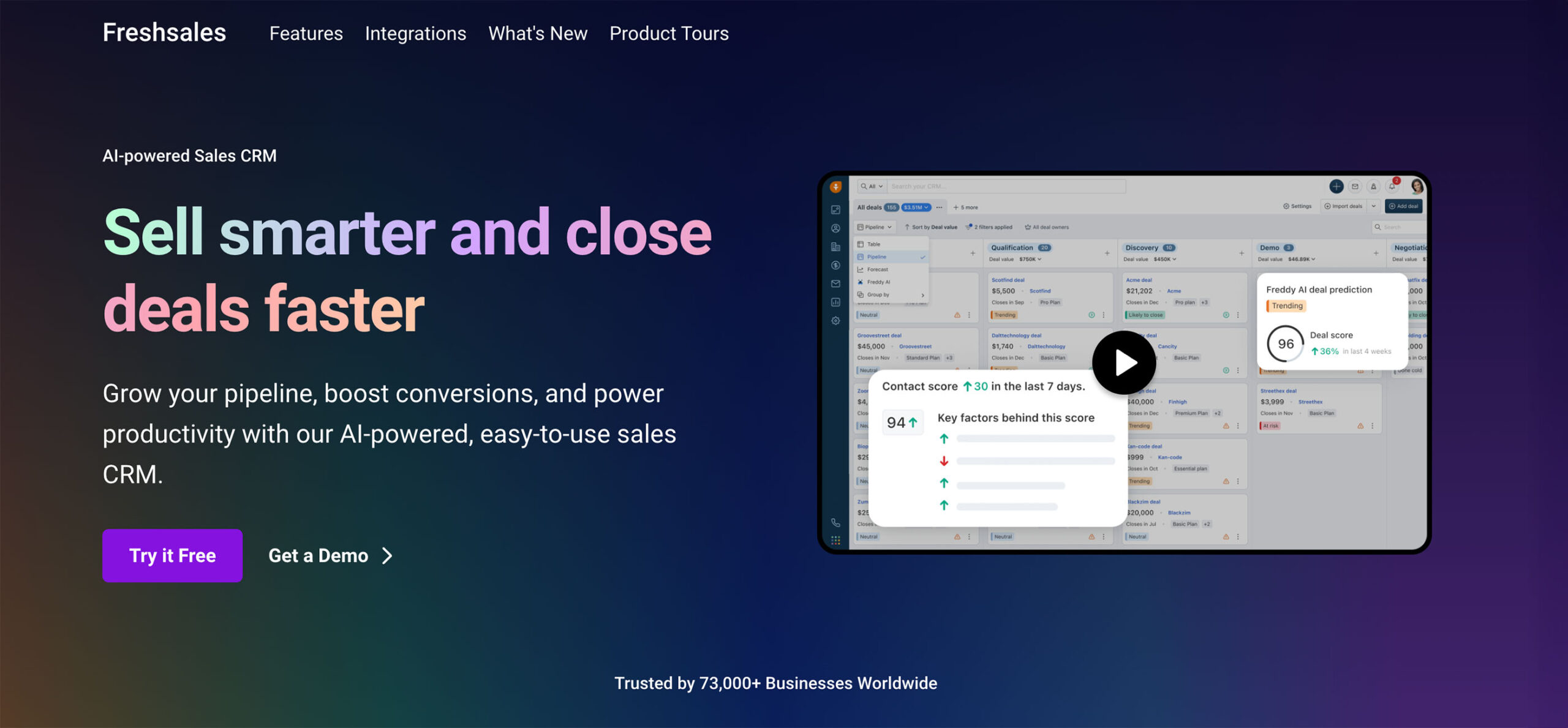
Freshsales is a straightforward, affordable CRM for small businesses, but it lacks the depth needed for multi-entity operations.
Strengths:
- User-friendly interface and affordable pricing.
- Strong contact management and deal tracking.
Limitations:
- Limited multi-business support, relying mostly on tagging and manual filters.
- Lacks advanced accounting integrations, making it less suitable for QuickBooks users.
Monday CRM: Flexible but lacks deep financial integration
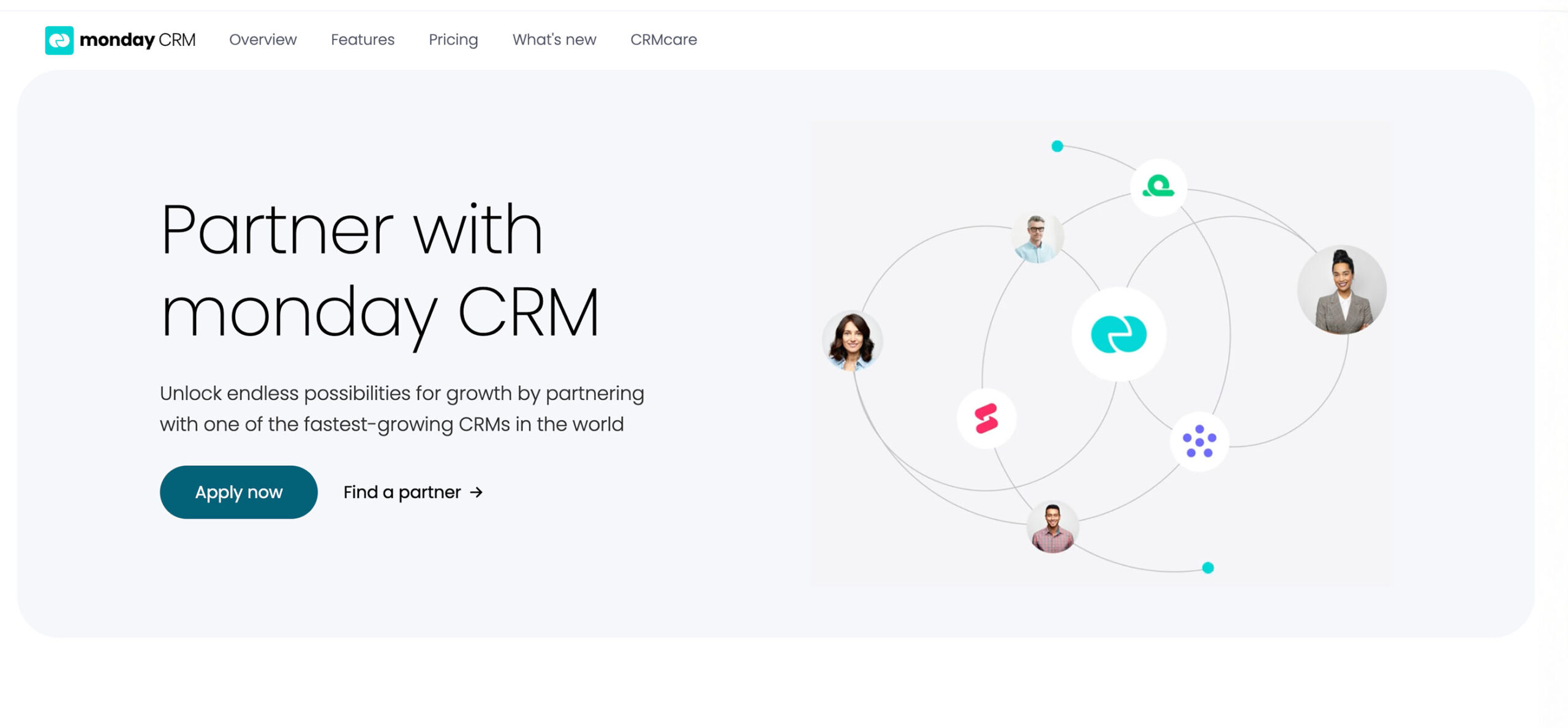
Monday CRM offers a highly visual, customizable workspace, but it isn’t designed for complex multi-entity management without heavy configuration.
Strengths:
- Flexible, visually intuitive design.
- Strong project management tools.
Limitations:
- Not built for financial data management or multi-entity support out of the box.
- Requires significant customization for more complex use cases.
Pipedrive: Sales-focused, not built for multi-entity
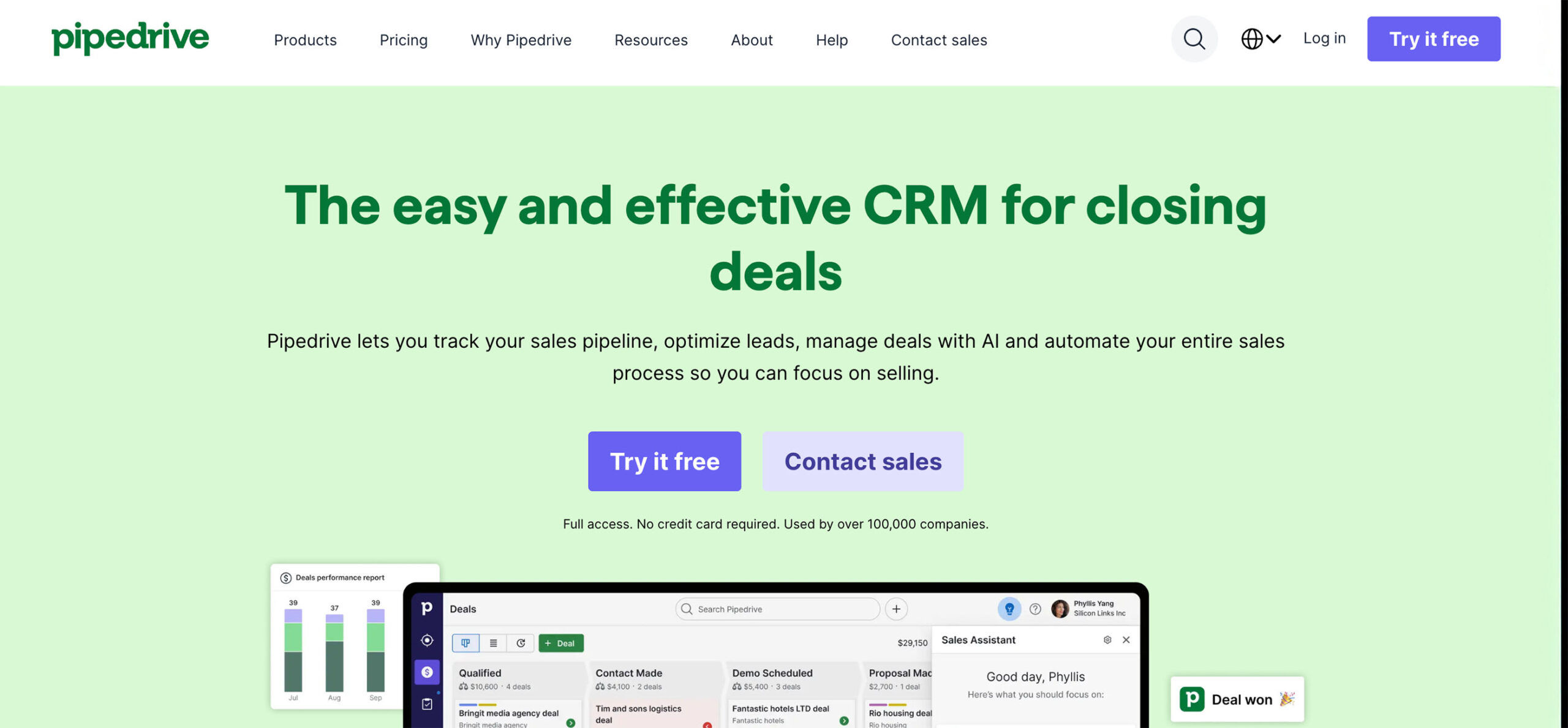
Pipedrive is a solid choice for sales-driven teams but lacks the structural flexibility for multi-business owners.
Strengths:
- Simple, sales team focused interface.
- Strong pipeline management and deal tracking.
Limitations:
- No built-in multi-entity support.
- Limited accounting integrations, requiring third-party tools for financial management.
For businesses managing multiple entities, the right CRM can be the difference between streamlined growth and constant operational headaches.
Method CRM stands out for its unique multi-entity capabilities, deep QuickBooks integration, and powerful customization options, making it a clear choice for businesses that need more than just contact management.
Of course, the right CRM entirely depends on your unique needs. We recommend exploring all of the options listed above—and even extend your research to free CRMs if you’re just getting started—to determine which CRM platforms tick all of your boxes. If that’s Method CRM, then great! We’d love to chat.
Choose Method CRM to manage multiple businesses
Managing multiple businesses is a complex challenge, but the right CRM system can turn that complexity into a competitive advantage. With CRM features like real-time multi-QuickBooks sync, powerful customization options, and centralized data management, Method CRM stands out as the ideal solution for business owners looking to simplify their operations and scale with confidence.
By consolidating customer relationships, automating workflows, and providing real-time insights across all your businesses, Method CRM eliminates the inefficiencies and data silos that hold companies back. It’s a platform built for owners who need more than just contact management – it’s designed for multi-entity growth.Ready to bring all your businesses under one roof? Discover how Method CRM can help you consolidate data, streamline workflows, and get real-time insights into every aspect of your business. Get a demo of Method here.




